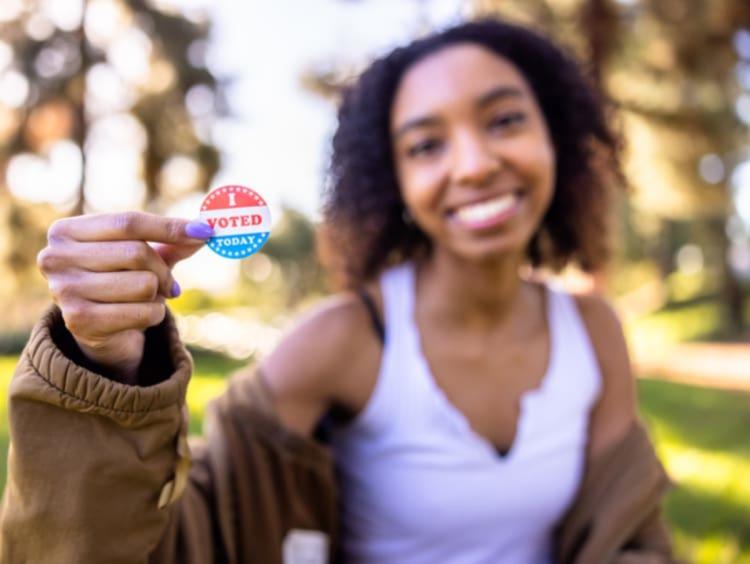Getting out the vote and hashing out the issues
Nonpartisan, campuswide initiative aims to help students get registered and vote, as well as learn about the candidates and issues
A significant and growing body of research shows that whether people vote in their first two elections can significantly alter their voting behavior for the rest of their lives.
“We know that voting and civic participation habits get set in your 20s—so basically, people who are college age and just a little bit older,” explains Janet Donavan, a teaching professor and director of undergraduate studies in the University of Colorado Boulder Department of Political Science. “If we can get people voting in their first or second election, it helps set the habits of a lifetime for them. If they miss those first two elections, they’re unlikely to vote throughout their lives.”
Any challenges associated with voting can be compounded for college students—from learning about eligibility and how to register to figuring out how to request a ballot if they live outside their home counties or states.
What: Presidential Debate Watch Party
When: 6:30-9:30 p.m. Tuesday, Sept. 10
Where: Center for Teaching and Learning, CASE Building, E390
Who: All CU students are invited
However, a campuswide initiative between now and election day, Nov. 5, aims not only to help eligible students get registered to vote and to the polls, but to offer information and opportunities for discussion as they become lifelong participants in civic and political process.
One of the first events will be a non-partisan presidential debate watch party from 6:30 to 9:30 p.m. Tuesday with faculty moderators Regina Bateson, Carol Conzelman, Leah Sprain and Donavan, who also is Higher Education and Democracy Fellow with the Office for Public and Community-Engaged Scholarship.
“One of the things that we’re excited about, doing this debate watch—and we also have one planned for Oct. 1 for the vice-presidential debate—is we haven’t had organized debate watches of any large scale since 2012,” Donavan says.
“In 2016, people were afraid, which was a new thing for us to have such a polarized campus, and in 2020 it was COVID. But I and some of the other people who are part of this, we have decided that if we do live in this contentious political world, we do need to find ways to move forward and talk about it, even if it’s hard.”
Fostering civic culture
The voter registration events scheduled for the next two months dovetail with CU Boulder’s participation in the ALL IN Campus Democracy Challenge, which aims to “foster civic culture and institutionalize democratic engagement activities and programs at colleges and universities, making them a defining feature of campus life.” The initiative also works to close voting gaps based on age and race.
An element of ALL IN is that participating colleges and universities can compete with each other for highest voter turnout “and the idea there is that it will be motivating for students if it’s a little bit of a competition,” Donavan says.
The events and initiatives that Donavan and her colleagues in departments and offices throughout the university are planning focus not only on voting, but on education about candidates and issues.

A significant body of research demonstrates that an individual's lifetime voting habits are established in young adulthood. (Photo: iStock)
“For example, with the debate watch party, a big part is going to be just learning what the different candidates think,” Donavan says. “Because it’s a non-partisan event, it’s going to be a little different environment than if you were watching with your friends, because your friends might all have similar partisan commitments. This is for students who are supportive of Harris, who are supportive of Trump and those who just don’t know yet.
“We’re also emphasizing that it’s not just focused on political science. There are so many people who care about politics who are business majors or engineering majors or any other major and just want to learn more about the candidates and issues. We hope this is an opportunity for people to get more involved in the CU community while learning more about each other.”
A lifetime habit
Donavan and her colleagues, as well as campus and community partners, also are coordinating classroom visits to present information about registering to vote and voting. For example, in partnerships with the Byron White Law Centerand the American Indian Law Clinic, law students trained in voting law will have tables at various events to help students who might be having trouble registering to vote.
“It all goes back to the fact that if people don’t vote in their first or second elections, they might not vote for the rest of their lives,” Donavan says, adding that an aspect of the educational efforts will be the importance of non-presidential elections and down-ballot issues.
“If you’re voting in Colorado, the presidential race probably not going to be tightly competitive race, but we have two hot House races and issues on the ballot that are going to matter to students a lot.
“How many people were kicking themselves was over that they could have voted for if only they’d voted? We want help students make voting a lifetime habit.”
Did you enjoy this article? Subscribe to our newsletter. Passionate about arts and sciences? Show your support.

